- Clone
- ASL-32 (See other available formats)
- Regulatory Status
- RUO
- Other Names
- CEACAM1/5/6, BGP, NCA
- Isotype
- Mouse IgG2b, κ
- Ave. Rating
- Submit a Review
- Product Citations
- publications
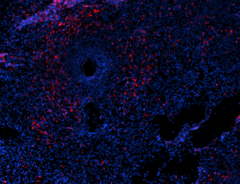
-

Human paraffin-embedded spleen tissue slices were prepared with a standard protocol of deparaffinization and rehydration. Antigen retrieval was done with Citrate buffer 1X pH 6.0 at 95°C for 40 minutes. Tissue was washed with PBS/0.05% Tween 20 twice for five minutes and blocked with 5% FBS and 0.2% gelatin for 30 minutes. Then, the tissue was stained with 10 µg/mL of anti-human CD66a/c/e (clone ASL-32) Spark YG™ 570 (red) at 4°C overnight. Nuclei were counterstained with DAPI (blue). -

Human paraffin-embedded colon tissue slices were prepared with a standard protocol of deparaffinization and rehydration. Antigen retrieval was done with Citrate buffer 1X pH 6.0 at 95°C for 40 minutes. Tissue was washed with PBS/0.05% Tween 20 twice for five minutes and blocked with 5% FBS and 0.2% gelatin for 30 minutes. Then, the tissue was stained with 10 µg/mL of anti-human CD66a/c/e (clone ASL-32) Spark YG™ 570 (red) and anti-Pan-Cytokeratin (clone C-11) Alexa Fluor® 488 antibody (green) at 4°C overnight. Nuclei were counterstained with DAPI (blue). The image was scanned with a 10X objective and stitched with software. -

Human colorectal adenocarcinoma cell line HT-29 was stained with anti-human CD66a/c/e (clone ASL-32) Spark YG™ 570 (filled histogram) or mouse IgG2b, κ isotype control (open histogram).
| Cat # | Size | Price | Save |
|---|---|---|---|
| 342327 | 25 µg | ¥29,920 | |
| 342328 | 100 µg | ¥73,700 |
The ASL-32 mAb reacts with an antigen epitope shared by CD66a, c and e. CD66a/c/e are members of the CEA (carcinoembryonic antigen) family of the Ig superfamily. CD66 plays a role in hemophilic and heterophilic adhesion. CD66a, also known as CEACAM1 and BGP (biliary glycoprotein), is mainly expressed on granulocytes, binds to CD66a, c, e, and CD62E. CD66c (known as CEACAM6, NCA) is expressed on granulocytes and epithelial cells. The ligands of CD66c are CD66a-e, CD62E and Galectins. CD66e molecule is also called CEA or CEACAM5, and is primarily found on epithelial cells. CD66e binds to CD66a, c and e.
Product DetailsProduct Details
- Verified Reactivity
- Human
- Antibody Type
- Monoclonal
- Host Species
- Mouse
- Formulation
- Phosphate-buffered solution, pH 7.2, containing 0.09% sodium azide
- Preparation
- The antibody was purified by affinity chromatography and conjugated with Spark YG™ 570 under optimal conditions.
- Concentration
- 0.5 mg/mL
- Storage & Handling
- The antibody solution should be stored undiluted between 2°C and 8°C, and protected from prolonged exposure to light. Do not freeze.
- Application
-
IHC-P - Quality tested
FC - Verified - Recommended Usage
-
Each lot of this antibody is quality control tested by formalin-fixed paraffin-embedded immunohistochemical staining. For immunohistochemistry, a concentration range of 5 - 10 µg/mL is suggested. For flow cytometric staining, the suggested use of this reagent is ≤ 0.5 µg per million cells in 100 µL volume. It is recommended that the reagent be titrated for optimal performance for each application.
* Spark YG™ 570 has a maximum excitation of 555 nm and a maximum emission of 570 nm. -
Application References
(PubMed link indicates BioLegend citation) -
- Shey MS, et al. 2012. J Immunol Methods. 376:79. PubMed.
- RRID
-
AB_2904361 (BioLegend Cat. No. 342327)
AB_2904361 (BioLegend Cat. No. 342328)
Antigen Details
- Structure
- Member of the CEA (carcinoembryonic antigen) family of the Ig superfamily
- Distribution
-
Granulocytes, epithelial cells
- Function
- Homophilic and heterophilic adhesion
- Ligand/Receptor
- CD66a-e, CD62E, galectins
- Cell Type
- Epithelial cells, Granulocytes
- Biology Area
- Immunology
- Molecular Family
- Adhesion Molecules, CD Molecules
- Antigen References
-
1. Zola H, et al. 2007. Leukocyte and Stromal Cell Molecules:The CD Markers. Wiley-Liss. A John Wiley & Sons Inc. Publication
- Gene ID
- 634 View all products for this Gene ID
- UniProt
- View information about CD66a CD66c CD66e on UniProt.org
Related Pages & Pathways
Pages
Other Formats
View All CD66a/c/e Reagents Request Custom Conjugation| Description | Clone | Applications |
|---|---|---|
| Purified anti-human CD66a/c/e | ASL-32 | FC,IHC-P |
| PE anti-human CD66a/c/e | ASL-32 | FC |
| Alexa Fluor® 488 anti-human CD66a/c/e | ASL-32 | FC |
| APC anti-human CD66a/c/e | ASL-32 | FC |
| PE/Cyanine7 anti-human CD66a/c/e | ASL-32 | FC |
| PerCP/Cyanine5.5 anti-human CD66a/c/e | ASL-32 | FC |
| Brilliant Violet 421™ anti-human CD66a/c/e | ASL-32 | FC,IHC-P |
| Alexa Fluor® 594 anti-human CD66a/c/e | ASL-32 | IHC-P |
| Alexa Fluor® 647 anti-human CD66a/c/e | ASL-32 | FC,IHC-P |
| TotalSeq™-A0188 anti-human CD66a/c/e | ASL-32 | PG |
| APC/Fire™ 750 anti-human CD66a/c/e | ASL-32 | FC |
| Brilliant Violet 605™ anti-human CD66a/c/e | ASL-32 | FC |
| TotalSeq™-C0188 anti-human CD66a/c/e | ASL-32 | PG |
| Spark YG™ 570 anti-human CD66a/c/e | ASL-32 | IHC-P,FC |
| TotalSeq™-B0188 anti-human CD66a/c/e | ASL-32 | PG |
| Spark Red™ 718 anti-human CD66a/c/e (Flexi-Fluor™) | ASL-32 | FC |
| Spark Blue™ 574 anti-human CD66a/c/e (Flexi-Fluor™) | ASL-32 | FC |
| Spark Blue™ 550 anti-human CD66a/c/e (Flexi-Fluor™) | ASL-32 | FC |
Compare Data Across All Formats
This data display is provided for general comparisons between formats.
Your actual data may vary due to variations in samples, target cells, instruments and their settings, staining conditions, and other factors.
If you need assistance with selecting the best format contact our expert technical support team.
-
Purified anti-human CD66a/c/e
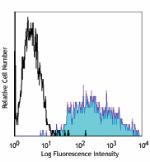
Human colorectal adenocarcinoma cell line HT29 stained with ... 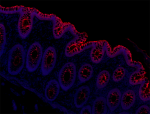
Human paraffin-embedded colon tissue slices were prepared wi... -
PE anti-human CD66a/c/e

Human colorectal adenocarcinoma cell line HT29 stained with ... -
Alexa Fluor® 488 anti-human CD66a/c/e
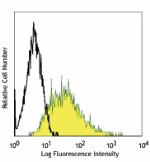
Human colorectal adenocarcinoma cell line HT-29 stained with... -
APC anti-human CD66a/c/e
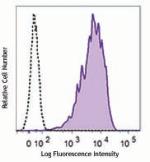
Human colorectal adenocarcinoma cell line HT-29 was stained ... 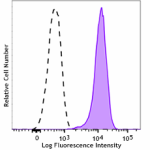
Human peripheral blood granulocytes were stained with CD66a/... -
PE/Cyanine7 anti-human CD66a/c/e
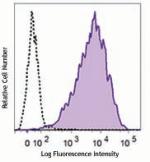
Human colorectal adenocarcinoma cell line HT-29 was stained ... -
PerCP/Cyanine5.5 anti-human CD66a/c/e
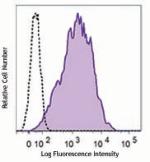
Human colorectal adenocarcinoma cell line HT-29 was stained ... -
Brilliant Violet 421™ anti-human CD66a/c/e
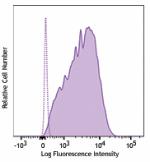
Human colorectal adenocarcinoma cell line HT-29 was stained ... 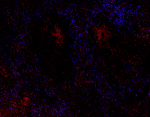
Human paraffin-embedded spleen tissue slices were prepared w... -
Alexa Fluor® 594 anti-human CD66a/c/e
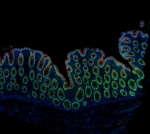
Human paraffin-embedded colon tissue slices were prepared wi... -
Alexa Fluor® 647 anti-human CD66a/c/e
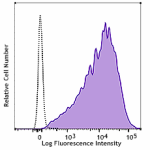
Human colorectal adenocarcinoma cell line HT-29 was stained ... 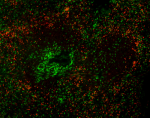
Human paraffin-embedded spleen tissue slices were prepared w... -
TotalSeq™-A0188 anti-human CD66a/c/e
-
APC/Fire™ 750 anti-human CD66a/c/e
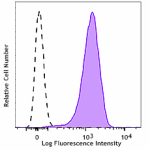
Human peripheral blood granulocytes were stained with CD66a/... -
Brilliant Violet 605™ anti-human CD66a/c/e
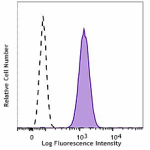
Human peripheral blood granulocytes were stained with CD66a/... -
TotalSeq™-C0188 anti-human CD66a/c/e
-
Spark YG™ 570 anti-human CD66a/c/e
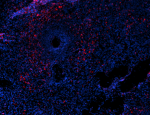
Human paraffin-embedded spleen tissue slices were prepared w... 
Human paraffin-embedded colon tissue slices were prepared wi... 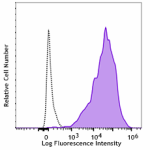
Human colorectal adenocarcinoma cell line HT-29 was stained ... -
TotalSeq™-B0188 anti-human CD66a/c/e
-
Spark Red™ 718 anti-human CD66a/c/e (Flexi-Fluor™)
-
Spark Blue™ 574 anti-human CD66a/c/e (Flexi-Fluor™)
-
Spark Blue™ 550 anti-human CD66a/c/e (Flexi-Fluor™)













Follow Us